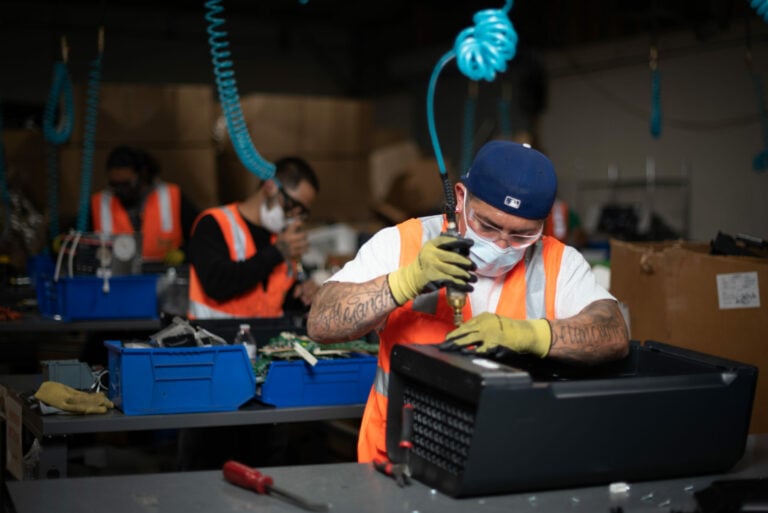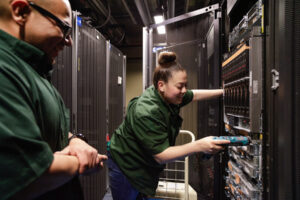
Guess Inc.’s partnership with a local nonprofit is providing a second life for used clothing and creating stable jobs for marginalized individuals. It’s also helping the downtown-based retailer embrace a circular business model, complete with plans to generate 10% of its sales by 2029 via merchandise resale, rental, repairs or remaking.
Guess began offering a 15% discount on full-priced merchandise this month to consumers who bring in five or more garments they no longer want. Its retail team then sends the articles of clothing to Homeboy Electronics Recycling in Commerce, where they’re sorted for recycling, resale, donation or upcycling.
“Homeboy already specializes in recycling electronics, but this also gives them an avenue to create job opportunities within their community in the apparel business in a sustainable way,” Courtney Culbreath, Guess’ associate director of social responsibility and diversity and inclusion, said via email. “We started a similar recycling pilot at our Canada stores this week with Debrand. We are hoping to expand this initiative globally.”
If donated goods contain Guess garments, the company’s designers reuse them to create new pieces, a process that is part of its Upcycle Collection.
“An example is they made bandage dresses into dog leases or denim pants into a corset,” Culbreath said. “On the Homeboy side, they can (create revenue by reselling goods) directly to consumers or through an approved wholesaler.”
Other local brands incorporating circular model include Outerknown, a Culver City-based apparel-maker that offers its customers opportunity to buy or sell gently used Outerknown clothing via its main website. There’s also NatureUSA in Compton, an apparel designer and manufacturer that kicked off a circular fashion pilot program in December 2019, under which the company offers to take back every garment it sells and either reuse it as raw materials or recycle it.
New jobs
Guess generated net income of $171 million on $2.59 billion in revenue during its fiscal year 2022, which ended on Jan 31. The company operates 1,068 stores in the Americas, Europe, the Middle East and Asia. Its partners and distributors run 563 additional retail stores, for a total of 1,631 locations.
Homeboy Electronics Recycling, meanwhile, is part of Chinatown-based Homeboy Industries Inc., a nonprofit that’s been providing training and employment to formerly incarcerated or gang-affiliated youth since 1988. The recycling division was created in 2016, when Homeboy Industries acquired Isadora Electronics Recycling, a company that Kabira Stokes founded in 2011 as an e-waste recycling enterprise to provide jobs to the same population Homeboy was serving.
The recycling division’s core services — until crossing paths with Guess — revolved around electronics reuse and recycling.
“On the reuse side we do repair, refurbishment and remarketing, and then … if we can’t come up with a better option to reuse, then we want to recycle,” said Chris Zwicke, Homeboy Electronics Recycling’s chief executive. “All of that’s avoiding things going to a landfill, but in our case we try to reuse wherever we can before resorting to recycling.”
The division also provides IT asset disposition, an industry term that encompasses inventory reconciliation and data wiping.
“When an organization is getting rid of electronics they need to track that by make, model, serial number, and make sure that they remove it from their asset-tracking system and that we have an auditable paper trail for that,” Zwicke said.
“It’s really about making sure that we have really good data about what’s been taken, how it was destroyed or wiped or sanitized, and providing that to our clients, especially those in regulated industries like healthcare and financial services.”
Guess’ partnership with Homeboy began as a trial last year, and fully launched in April, Culbreath said.
“When Guess approached us about doing some apparel work for them, we thought it was a really interesting opportunity (where we could) actually use a lot of the same skills that we already have developed in the electronic space, and the pilot proved that,” Zwicke said. “We’re really good at taking back used things, figuring out the best option of what to do with them, and then providing a maximum level of transparency and traceability in that process so that our upstream partners who are providing us with those things … are really comfortable, confident and knowledgeable about how they’re being processed.”
The partnership has enabled Zwicke to hire more workers, for a total of 37. Another nine or so trainees are rotating through on a daily basis and are in the Homeboy Industries’ eight-month training program.
And with other apparel companies now looking to follow in Guess’ footsteps, Zwicke plans to add more jobs.
“Brands are approaching us left and right about it because there’s a huge need,” Zwicke said. “When you throw something away, there is no “away” — away is a place and most people don’t want to know what’s really happening to it, but we see there’s plastic floating in our oceans, there are landfills overflowing with stuff, there are textiles washing up on the beaches of West Africa.”
Zwicke said Homeboy is running a single work shift at its facilities, but “we can always run up to three shifts … as long as we have the demand for IP asset disposition electronics, recycling, apparel reuse, apparel recycling, we’ve got the ability to scale up rapidly and that’s what we want to do—we want to keep creating jobs and diverting stuff from the landfill and reducing emissions.”
Business model
Some customers pay a per-item or per-pound service fee to Homeboy Electronics Recycling to process their merchandise.
If items can be resold to cover the repair and other costs, then usually no money exchanges hands. On occasion, the division will buy items that are newer and have higher resale value.
“Many times we will have different arrangements with the same customer,” he said.
Refurbished items are usually sold via the company’s website or third parties, such as Amazon or eBay.

“Sometimes our customers have restrictions over what channels we can use, so for example we don’t sell any Guess material on those platforms,” Zwicke said. “But we also sell directly to the people who will come into our facility. We’re building out some mobile retail capabilities as well.”
If the quantities are larger, refurbished goods will go to a wholesaler. Brands can also pay Homeboy to donate their merchandise to a school or another organization after it’s been repaired and tested at its facility in Commerce.
“This is going to cost more in many cases than it would to landfill it because landfilling is effectively cheap,” Zwicke added. “But what we’re seeing is that that cost can also be used to create jobs, right? And we’re creating jobs for marginalized people and bringing marginalized people into a circular economy, which is, I think, a moral imperative as we’re going forward.”
In addition to refurbishing and reselling garments donated at Guess stores, Zwicke’s workers are also on the lookout for specific materials, garments and pieces that, as Culbreath described, can become the foundation for new garments created by the brand’s designers.
